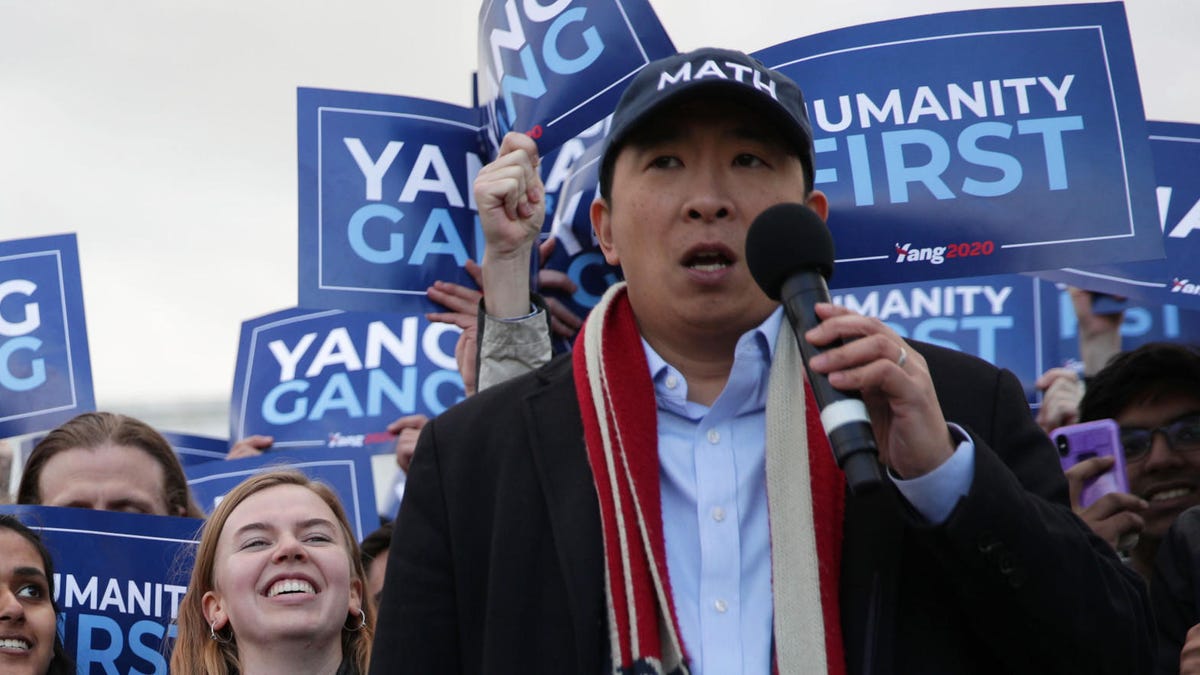Cryptocurrency needs government's help, says presidential hopeful Andrew Yang
Clearer rules for bitcoin and other virtual currencies will help the US innovate, argues Yang, a Democratic candidate for president.

Andrew Yang, son of an IBM researcher and university systems administrator, is a techno-savvy candidate for president. What's with the MATH hat? He told CNBC: "One of my supporters said something to me -- that the opposite of Donald Trump is an Asian man who likes math."
Cryptocurrency is now an official issue in the US presidential election.
You're probably most familiar with cryptocurrency by way of bitcoin , which soared in value in 2017 then mostly collapsed in 2018. But the technology spreads far beyond that, and presidential candidate Andrew Yang says now's the time for clearer government rules to encourage its development in the US.
Yang, a tech entrepreneur and now one of at least 18 Democratic challengers to Donald Trump, is far from the frontrunner for an election that's still a year and a half away. But the fact that he's weighing in at all shows that cryptocurrency and related technology, like blockchain , isn't just an obsession of crypto-anarchists who want a high-tech alternative to a safe full of Krugerrands.
If Yang gets his way, cryptocurrencies could become more useful and move beyond early problems like initial coin offering (ICO) scams and criminal payment uses. Maybe they'll even be something you use in your daily life.
Today's rules, including federal and some state laws, have had "a chilling effect on the US digital asset market," and laws haven't kept up with cryptocurrency developments, Yang said in policy paper published Thursday. "Uncertainty in what regulatory framework will develop is causing US investment in the area to lag behind the investment of other countries."
Cryptocurrencies are far more complicated than the rise and fall of bitcoin. People have mostly treated them as assets to invest or speculate in. Cryptocurrencies can also serve a purpose similar to plain old money used to buy and sell things, or to store value.
The accounting mechanism behind cryptocurrencies, called blockchain, can be used for all sorts of record keeping, like the sale of houses or the tracking of inventory. "The blockchain has vast potential," Yang wrote.
Yang: Not every crypto asset is a security
Yang argues that US regulations must differentiate between cryptocurrencies used as money and cryptocurrencies used as securities, like company stock, that you can invest in. He also calls for consumer protections for cryptocurrency transactions, as well as simpler tax rules for buying and selling digital assets.
Today, the IRS treats cryptocurrency largely as a security. If you buy some cryptocurrency and it rises in value, you have to pay tax on any profits you make when you sell it. That tax treatment is at odds with the idea that cryptocurrency can function as money.
Though Yang shows a certain enthusiasm for cryptocurrency issues, at least compared with his Democratic rivals, that doesn't mean everybody in the cryptocurrency world is a fan. One person's clear regulation and consumer protection is another person's government meddling.
For example, one person in Reddit's cryptocurrency forum assessed Yang's cryptocurrency proposal as an effort to "tax it to oblivion" and require us to report all past and current cryptocurrency holdings to the IRS.
Andrew Yang, cryptocurrency candidate
Yang had already staked out a claim as the cryptocurrency candidate in his 2018 announcement, in which he said he'd accept donations in bitcoin, ether and other cryptocurrencies. The process isn't simple, though, and requires "a 15-minute phone call with a member of the compliance team."
Meanwhile, Yang also would like to see the US get rid of a financial instrument he sees as obsolete: the penny.
Yang during an interview at CNET in March.
"It costs more to make a penny than it is worth," which means taxpayers have to pay $70 million a year, Yang argues. "Getting rid of them will save us money and time. Good for the environment too."
Yang, the son of an IBM researcher and university systems administrator, is a techno-savvy candidate. In an interview at CNET in March, Yang discussed everything from drones to deplatforming people on social media to Trump's Space Force. Among other technology related stances in his policy positions, Yang wants to:
- Create a Department of Technology to regulate AI from its headquarters in Silicon Valley.
- Pay all adults $1,000 a month in a universal basic income designed to "prevent the massive disruption" that's coming as technology like AI automates people's jobs.
- Restore net neutrality through FCC oversight of internet service providers.
- Shift to new security algorithms that quantum computers can't crack and research those potentially radical machines to "develop our own systems ahead of our geopolitical rivals."
- Modernize the US electrical grid, with smart meters in houses and tariffs to encourage renewable energy.
- Pay for body cameras on all police officers.
- Move to a value-added tax system, common in other countries, which Yang believes will function better as technology automates today's jobs.
- Combat climate change by investing in technology to capture carbon dioxide and geoengineering, such as attempts to have the atmosphere reflect more of the sun's energy back into space. He also is in favor of nuclear energy.
- Invest in more technology to monitor border security.
- Appoint a news ombudsman to find and banish fraudulent accounts on social media in order to curb misinformation and foreign intervention in elections.
It'll be difficult to finding political consensus on any of those issues, much less to win an election on them. But as the digital revolution spreads to every corner of our lives, expect more politicians to acquire Yang's taste for tech.

